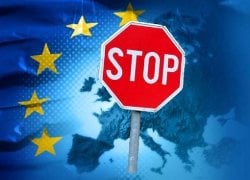European human rights activists are calling for increased sanctions against Lukashenko
11- 18.10.2013, 14:04
- 45,185

EU urged to pay attention to the companies supporting the dictatorship by exporting to the EU.
Yesterday human rights groups from Sweden, the Czech Republic, Germany, Estonia, Slovakia, Finland, Switzerland, and Norway sent a letter to the ministers of foreign affairs of EU member states and the EU High Representative for Foreign Affairs and Security Policy Catherine Ashton, which said that sanctions “in their current form are ineffective.” “Only a consistent EU strategy with the use of effective restrictive measures can lead to positive change in Belarus, starting with release and rehabilitation of all political prisoners”. The letter was also signed by former presidential candidate and former political prisoner Andrei Sannikov who is a democratic opposition leader and the head of the Civic Movement "European Belarus".
The letter was sent on the eve of a meeting of the Council on Foreign Affairs of the European Union which will be held in Luxemburg on 21 October to discuss sanctions. The current EU sanctions against more than two hundred Belarusian individuals and companies expire in the end of October, and 28 EU member states will have to make a decision at the Council meeting whether to extend the current sanctions as they stand now, delete some names or add new names.
The authors of the letter included a policy paper published a few days ago by the Working Group on Investment of the Committee of International Control over the Human Rights Situation in Belarus, an international coalition of more than 40 NGOs. The paper provides analysis of why the EU economic sanctions were effective in the beginning and why they stopped working. It argues that the EU does not sanction the companies that finance the Lukashenko regime through exports to and through the EU and that exports to the EU are therefore growing, even under sanctions. It states that sanctions should be made effective by reducing and threatening to reduce exports. This can be done by closing loopholes left in 2012 and by counterbalancing expected delistings with additional listings of several leading Belarusian companies, many of which are owned by Belarusian oligarchs who receive special benefits from the regime in exchange for financial support.. Human rights groups who signed the letter to the EU say that they strongly endorse these conclusions and that “these recommendations if adopted would go a long way towards fostering positive change in Belarus.”
The letter says that despite multiple promises to release political prisoners given to EU by envoys of Lukashenka, the situation for political prisoners has deteriorated and not a single improvement in the human rights situation and rule of law has been registered in Belarus in 2013. Recently the number of political prisoners has once again increased. At least ten political prisoners remain behind the bars and are serving their terms in unbearable conditions. Several dozen more people who have served their terms or were pardoned have their civil and political rights severely restricted and constantly face a danger of repeated arrests. Repressions against civil and political activists, independent journalists and lawyers continue unabated. Fundamental freedoms of expression, assembly, association and the right to a fair trial continue to be systematically violated. All of this takes place against a background of increasing EU “dialogue” with Belarus. The “dialogue” is not working and restrictive measures which once proved effective in gaining the release of political prisoners are now so weakened that they are failing to produce results, say the authors of the letter.
EU sanctions, which were previously effective in gaining the release of political prisoners, have become ineffective due to loopholes and a lack of political will to expand sanctions. It should not be surprising, write authors of the letter to EU, that weakly applied sanctions which allowed trade between Belarus and EU to increase, were not promoting positive change in Belarus. Loopholes created for private Belarusian petrochemical exporters due to the business interest of some EU member states allowed the regime to earn an additional 3 billion US dollars in 2012 and stay afloat.
“There is no incentive for the regime to release political prisoners or make other improvements when it believes it can continue to increase its revenues without doing so. It is essential that EU member states take a responsible decision now to extend and expand restrictive measures regarding Belarus,” - said Yuri Dzhibladze, coordinator of the Working Group on Investments of the Committee of International Control over the Human Rights Situation in Belarus and a co-author of the paper.
Andrei Sannikov said: “Every year the EU Council reassures us of their concern and demonstrates their resolve by extending the restrictive measures. It's time to prove its resoluteness by expanding the sanctions instead of doing nothing to make them effective. The latest news from political prisoners, especially Mikola Statkevich and Mikolai Avtukhovich whose letter from prison was called by media a "letter from hell" proves that their lives are in danger and warrant the EU to act decisively"
The policy paper with recommendations by the Working Group on Investment of the Committee of International Control over the Human Rights Situation in Belarus can be found here.
The list of organisations which have endorsed the recommendations includes Civic Movement "European Belarus" (Belarus and Poland), Ostgruppen (Sweden), Norwegian Helsinki Committee (Norway), AdHoc (Slovakia), “People in Need” (Czech Republic), Open Estonia Foundation (Estonia), Libereco – Partnership for Human rights (Switzerland and Germany), Finnish-Russian Civic Forum (Finland).









